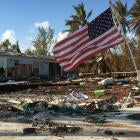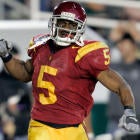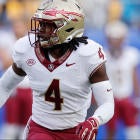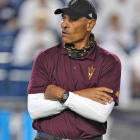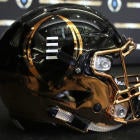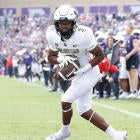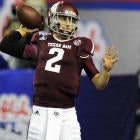When Miami tees it up this week against Toledo, South Florida's most famous, most celebrated and most historic program will be mostly worn. The Hurricanes will have gone three weeks between games.
There has been anything but rest dodging Hurricane Irma while the region fortunately dodged a direct hit. Consecutive days without water is a bigger concern than any winning streak. Power restored is more important than power football.
Forget about a bowl. South Florida and its surrounding areas have been bowled over.
The Hurricanes are just now digging out from being ravaged by a hurricane.
"Some of our guys, quite frankly, didn't have a whole lot to eat for a day or two," Miami coach Mark Richt said. "… We have to get used to tackling again, blocking again."
They are not alone, of course. Players at Rice, Houston, Miami, Florida, Florida State, Central Florida, Florida Atlantic and Florida International spent a combined 35 days away from campus escaping hurricanes Harvey and Irma. Classes at those schools have been cancelled for a combined 73 days.
A collective seven games were cancelled among those seven schools, creating a rescheduling ripple effect around the country.
When their seasons resume Saturday, UCF (23 days), FSU (three weeks) and UM (three weeks) will not have played football in a combined 65 days.
As hurricanes seemingly become more frequent and humanity becomes more vulnerable, when is it proper to concentrate on football again?
"I just don't know how if there is any elephant in the room you [don't] talk about it," said Florida coach Jim McElwain whose team returned to action Saturday. "We've got some really good psychologists ... if you need someone to talk to … because I'm certainly not an expert."
Did any of his players take advantage of psychological counseling?
"I say this in this way," McElwain said, "yes."
He did not elaborate. In some way, it almost seems disrespectful to talk football. Families were uprooted. Property was destroyed. Lives were lost.

McElwain and FIU coach Butch Davis each suffered minor damage to their homes but were reluctant to talk about it as some Floridians have no place to live.
"If you watched the damn Weather Channel, we were getting nuclear bombed," McElwain said. "There was no way to say, 'Hey, forget about it.' We didn't do that. What we did do is use this time for a release. In other words, here's a time to get the clutter out."
Florida got back into football routine with a rivalry win Saturday against Tennessee. But will anything ever be the same again this season?
"I do think there is relief to be playing football again," said Jennifer Strawley, Miami's deputy athletic director. "I do think there is some relief [that] it wasn't catastrophic."
South Florida did not take a direct hit from Irma, but the damage was enough. Armed with the knowledge that a Category 5 hurricane was headed "straight down the throat of downtown Miami," Davis took his team to Birmingham, Alabama, for eight days.
The trip came together in 36 hours with busses ordered, hotels reserved and psyches smoothed.
The trip will be "Chapter 13 in the book, trust me," Davis said of a history he has yet to write.
An FIU home game scheduled with Alcorn State was played a day earlier than scheduled in Birmingham's legendary Legion Field.
"People asked, 'Why did you play the game on Friday instead of Saturday?'" Davis said. "I wanted the game to be played to minimize the distraction. If we played on Saturday night, right in the middle of that hurricane, there wouldn't be a player or a coach not worried about the family they left behind or their houses."
FAU decided to travel to Wisconsin for its Sept. 9 game against Badgers -- with trepidation.
"At one point, I thought we weren't coming," coach Lane Kiffin said. "Our players didn't want to come because there's a lot of players not wanting to leave their families.
"You got kids coming into the office saying, "Coach, I know it's a football game, but I'm really the only one to take care of my grandma. We don't know what's coming.' "
The Owls got beat at Wisconsin then stayed in Madison three additional days. Upon leaving, Kiffin took out a full-page ad thanking Wisconsin for its hospitality.
This full-page ad was in today's @WiStateJournal from @FAU_Football and coach @Lane_Kiffin. pic.twitter.com/JQWGwR8JhK
— Todd Milewski (@ToddMilewski) September 15, 2017
Strawley was partially in charge of moving almost 380 Miami athletes off a campus that was closed. That doesn't mean all of them departed for Orlando for 12 days. Forty or so players went home to be with families as far away at California and Puerto Rico.
Classes at Florida and Miami don't begin again until Monday. One school official who preferred to remain anonymous didn't want to release players from campus for fear "they weren't ever going to come back." Hurricane Irma and its complications were that dangerous.
To get out of the storm's path, Miami bussed 10 hours to Orlando in a trip that usually takes nearly four hours.
"You look out the window, and it was like something I'd never seen," Strawley said. "Cars everywhere, pulled over on the side of the road, camping."
With that much traffic, how did, um, people answer the call of nature?
"Side of the road was pretty popular," she said.

McElwain has been through at least three of these things. He was Nick Saban's offensive coordinator in 2011 when a tornado leveled parts of Tuscaloosa, Alabama. Last year, administrators played a regrettable game of chicken over where the Florida-LSU game would be played.
The Gators finally relented, showing enough class and sense to allow its home game to be moved to Baton Rouge, Louisiana. After an emotional goal line stand preserved a win, McElwain said, "The way I look at it, they got what they deserved."
Alabama defensive back Minkah Fitzpatrick watched from afar with interest and sympathy. Six years ago, his family's New Jersey home was destroyed by flooding caused by Hurricane Irene.
"It's hard, especially if your house was effected directly by the storm," Fitzpatrick said. "You realize how little football really is when something like that happens. When you have no clothes, no shoes, no nothing. You're like, 'All right, this is just a game. It can wait.'"
American Athletic Conference commissioner Mike Aresco must have taken some calculus classes. To preserve the AAC's full conference schedule, Aresco oversaw seven teams rescheduling a total of seven games.
None of that includes FIU having to play on the day of Conference USA's title game (Dec. 2) against Massachusetts. If the Panthers somehow do get to that conference title game, the UMass game will be moved to another year.
Rice returned from a season-opening trip to Australia last month only to have to make a momentous decision once they landed at their LAX connection. Well, really, they needed a city to fly to. At that point, Houston wasn't an option.
The Owls flew to Dallas-Fort Worth where they practiced for a few days before bussing back to ravaged Houston.
Florida has lost four home games in the last three seasons: Idaho in 2014 to lightning, LSU in 2016 to Hurricane Matthew, Presbyterian in 2016 when it traveled to Baton Rouge for the rescheduled LSU game, and Northern Colorado in 2017 to Hurricane Irma. McElwain's concerns aren't so much for the program but for Gainesville's businesses.
"You're talking about businesses that count on those football Saturdays [to] make their year-end quotas," he said. "I feel for the people in town.
"Let's call it the way it is: [We missed at least] two probable wins. I kind of look at it as the opportunity for kids to play in The Swamp [and] the city of Gainesville what is lost."
Florida lost a home game, but its SEC hopes are still intact. The biggest football impact may be at Miami, Central Florida and Florida State. All three have played the fewest games in the country (one).
Their remaining regular-season games will be played in the next 10 weeks before their respective Dec. 2 conference championship games. One of the biggest games of the season -- Florida State-Miami -- was moved from Sept. 16 to Oct. 7.
When an ESPN executive texted Davis to check on him, the FIU coach suggested the network arrange a Rice-FIU game at Jerry World in Arlington, Texas.
The proceeds from a game at the gleaming world-class stadium, Davis said, could go to hurricane victims. Instead, this week's Owls-Panthers game at sure-to-be sparsely attended Rice Stadium holds some minor symbolism.
"Unbelievable that the two cities that got hit [Houston and Miami] are playing," Davis mused.
Back in South Florida, defeating Toledo is the issue for the Hurricanes after side-stepped a hurricane. Football will take some getting used to.
"I don't know long we can go hard," Richt admitted. "I'll know we'll go hard but how long can we go hard?"












